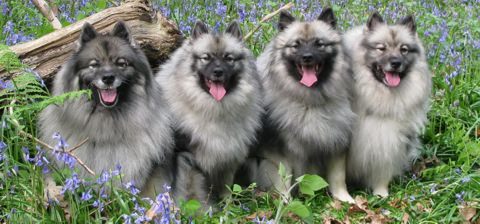


International Open Register - Tested Positive
Print Register (Requires pdf Reader)
International Open Register - Hereditarily Negative
International Open Register - Tested Negative
Print Register (Requires pdf Reader)
Print Register (Requires pdf Reader)
UK Open Register - Tested Positive
Print Register (Requires pdf Reader)
UK Open Register - Hereditarily Negative
UK Open Register - Tested Negative
Print Register (Requires pdf Reader)
Print Register (Requires pdf Reader)
It was 2000 when I first became aware of the “P” word and my beloved home bred Anni was finally diagnosed with a previously unknown condition. Despite successful treatment, the damage done to her kidneys prior to surgery eventually took her from us at the young age of 10. It is my belief that in talking about health concerns we can ensure they are consigned to history and Anni’s story was published in UK and overseas breed magazines.
In 2007 when we had access to a genetic test for PHPT, a UK open register was assembled with the support and guidance of the UK Kennel Club’s Genetic Health Coordinator. It wasn’t long before friends in other countries asked to list their dogs on the UK register. The obvious answer was to have a second registry for any other country that wished to participate and the register grew to its current size and scope.
Following the guidance of the Kennel Club on both document design and the need for absolute certainty by evidence before listing any dog, the dogs contained on the registers are only listed following evidence of status by Cornell Paperwork or listing on the Orthopedic Foundation for Animals website. All negative by descent listings are checked back to tested evidence before they are entered onto the negative by descent register.
Link to Orthopedic Foundation for Animals https://www.ofa.org/
In 2007 when we had access to a genetic test for PHPT, a UK open register was assembled with the support and guidance of the UK Kennel Club’s Genetic Health Coordinator. It wasn’t long before friends in other countries asked to list their dogs on the UK register. The obvious answer was to have a second registry for any other country that wished to participate and the register grew to its current size and scope.
Following the guidance of the Kennel Club on both document design and the need for absolute certainty by evidence before listing any dog, the dogs contained on the registers are only listed following evidence of status by Cornell Paperwork or listing on the Orthopedic Foundation for Animals website. All negative by descent listings are checked back to tested evidence before they are entered onto the negative by descent register.
Link to Orthopedic Foundation for Animals https://www.ofa.org/
Keeshond UK PHPT Registers
The UK Keeshond open register is committed to helping the Keeshond community in the United Kingdom and has listings for UK bred and UK resident dogs.
International PHPT Registers
The International open register, listing dogs from Australia, Austria, Belarus, Belgium, Bulgaria, Canada, Czech Republic, Denmark, Falkland Islands, Finland, France, Ireland, Italy, Germany, Lithuania, Malta, Netherlands, New Zealand, Norway, Poland, Ukraine, Russian Federation, Slovenia, Spain, Sweden, Switzerland, and the United States of America, is committed to helping the Keeshond/Wolfsspitz community worldwide.
The introduction to the International PHPT Registers is available in the following languages, for which we thank our Keeshond/Wolfsspitz friends in other countries who provided the translations.
Dogs are listed in their country of residence, and when this is other than the country of birth, they are moved to the appropriate national residence and their country of birth is indicated in brackets at the end of the registered name using the international two letter country code.
The introduction to the International PHPT Registers is available in the following languages, for which we thank our Keeshond/Wolfsspitz friends in other countries who provided the translations.
Dogs are listed in their country of residence, and when this is other than the country of birth, they are moved to the appropriate national residence and their country of birth is indicated in brackets at the end of the registered name using the international two letter country code.
The Keeshond UK Open Registers for PHPT
(UK Registered dogs only in this section)
The test for PHPT is available via the Cornell University Animal Health Diagnostic Centre (New York State USA) and their website provides detailed information on both the condition and also the testing procedure.
https://www.vet.cornell.edu/animal-health-diagnostic-center/testing/protocols/primary-hyperparathyroidism
PHPT in the Keeshond has an autosomal dominant mode of inheritance. The test confirms whether a dog is ‘positive’ for the PHPT gene or ‘negative’ for the PHPT gene. There is no carrier state in a dominant mode of inheritance.
The DNA test does not identify the clinical disease but rather indicates the presence of the gene. This indicates the genetic potential to develop the disease later in life.
If both sire and dam are negative for the defective gene then the progeny will be hereditarily negative (negative by descent) as they cannot inherit what their parents did not have.
More detailed information about the genetic implications of this dominantly inherited gene can be found
Tables listing tested gene negative, tested gene positive and hereditarily negative (negative by descent) dogs, in 'Easy View' & PDF format, are available from the following links:-
https://www.vet.cornell.edu/animal-health-diagnostic-center/testing/protocols/primary-hyperparathyroidism
PHPT in the Keeshond has an autosomal dominant mode of inheritance. The test confirms whether a dog is ‘positive’ for the PHPT gene or ‘negative’ for the PHPT gene. There is no carrier state in a dominant mode of inheritance.
The DNA test does not identify the clinical disease but rather indicates the presence of the gene. This indicates the genetic potential to develop the disease later in life.
If both sire and dam are negative for the defective gene then the progeny will be hereditarily negative (negative by descent) as they cannot inherit what their parents did not have.
More detailed information about the genetic implications of this dominantly inherited gene can be found
Tables listing tested gene negative, tested gene positive and hereditarily negative (negative by descent) dogs, in 'Easy View' & PDF format, are available from the following links:-
Keeshonds PHPT Tested Negative
Keeshonds PHPT Tested Positive
Keeshonds Hereditarily Negative
(Negative by Descent)
Keeshonds PHPT Tested Positive
Keeshonds Hereditarily Negative
(Negative by Descent)
Keeshonds PHPT Tested Negative (PDF format)
Keeshonds PHPT Tested Positive (PDF format)
Keeshonds Hereditarily Negative (PDF format)
(Negative by Descent)
Keeshonds PHPT Tested Positive (PDF format)
Keeshonds Hereditarily Negative (PDF format)
(Negative by Descent)
NL
FI
FR
DE
SE
IT
These lists are in the format used by the Kennel Club and list only those dogs registered in the UK.
If you would like to look at pedigrees associated with any of the dogs listed. These can be found on the site Keeshond World Pedigree Search that can be found at
http://www.keeshondworld.com/pedigree/pp_index.htm
If you would like to look at pedigrees associated with any of the dogs listed. These can be found on the site Keeshond World Pedigree Search that can be found at
http://www.keeshondworld.com/pedigree/pp_index.htm
PHPT Registers